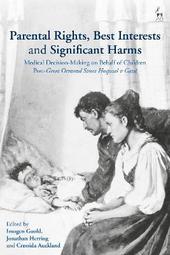
|
Parental Rights, Best Interests and Significant Harms: Medical Decision-Making on Behalf of Children Post-Great Ormond Street Ho
Paperback / softback
Main Details
| Title |
Parental Rights, Best Interests and Significant Harms: Medical Decision-Making on Behalf of Children Post-Great Ormond Street Ho
|
| Authors and Contributors |
Edited by Dr Imogen Goold
|
|
Edited by Jonathan Herring
|
|
Edited by Cressida Auckland
|
| Physical Properties |
| Format:Paperback / softback | | Pages:256 | | Dimensions(mm): Height 234,Width 156 |
|
| ISBN/Barcode |
9781509952182
|
| Classifications | Dewey:346.41017 |
|---|
| Audience | | Tertiary Education (US: College) | |
|---|
|
Publishing Details |
| Publisher |
Bloomsbury Publishing PLC
|
| Imprint |
Hart Publishing
|
| Publication Date |
17 June 2021 |
| Publication Country |
United Kingdom
|
Description
This timely collection brings together philosophical, legal and sociological perspectives on the crucial question of who should make decisions about the fate of a child suffering from a serious illness. In particular, the collection looks at whether the current 'best interests' threshold is the appropriate boundary for legal intervention, or whether it would be more appropriate to adopt the 'risk of significant harm' approach proposed in Gard. It explores the roles of parents, doctors and the courts in making decisions on behalf of children, actively drawing on perspectives from the clinic as well as academia and practice. In doing so, it teases out the potential risks of inappropriate state intrusion in parental decision-making, and considers how we might address them.
Author Biography
Imogen Goold is Associate Professor and Jonathan Herring is Professor at the Faculty of Law, University of Oxford. Cressida Auckland is Assistant Professor in the Department of Law at London School of Economics and Political Science.
ReviewsIn this important collection, the editors bring together a range of perspectives, including clinical, legal and philosophical, with a view to informing the debate as to whether the law should change. Crucially, it is a book that has a real chance of informing that debate because of the way in which the editors have approached their task. -- Alex Ruck Keene, 39 Essex Chambers * Mental Capacity Law and Policy Blog *
|